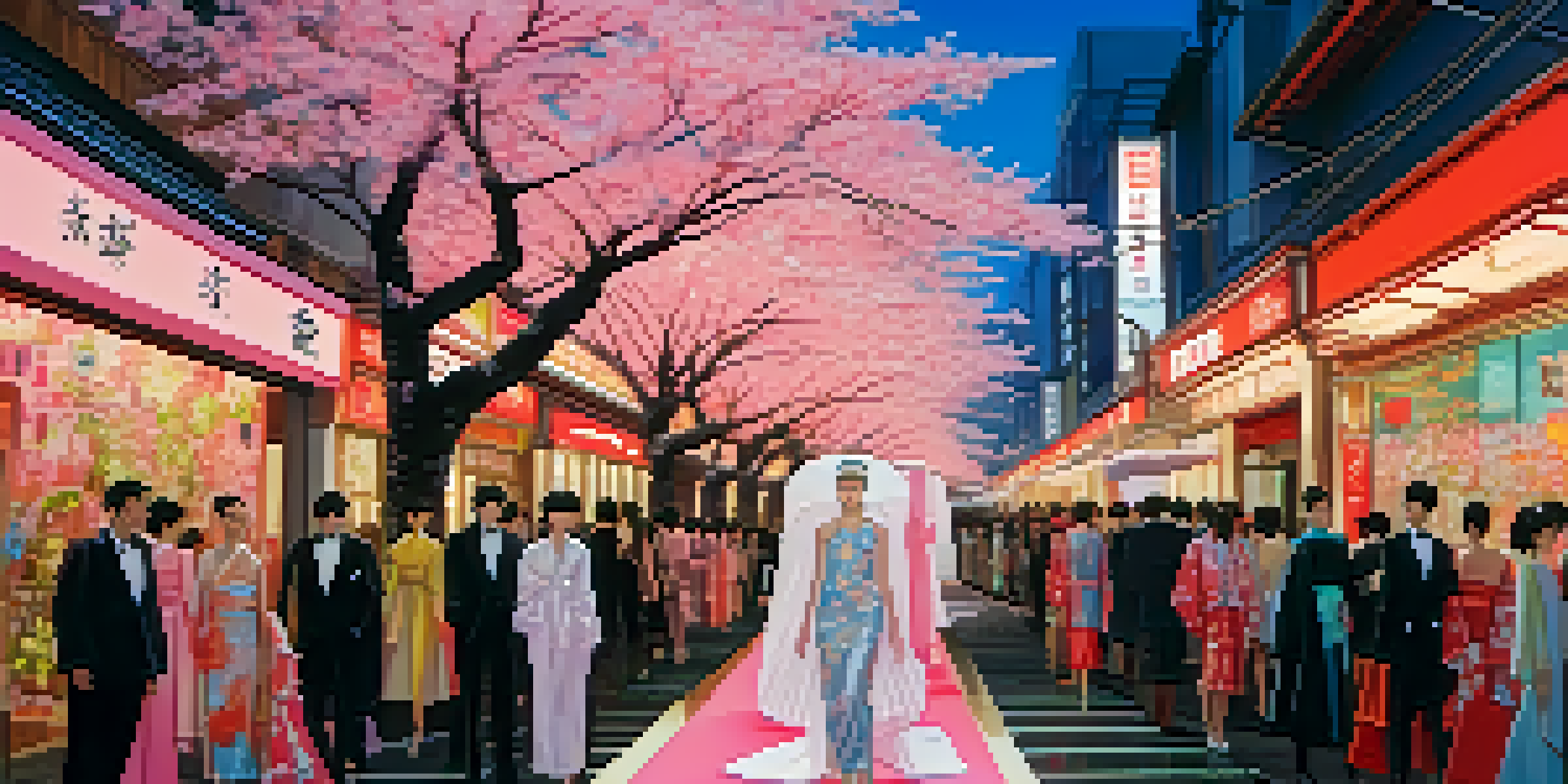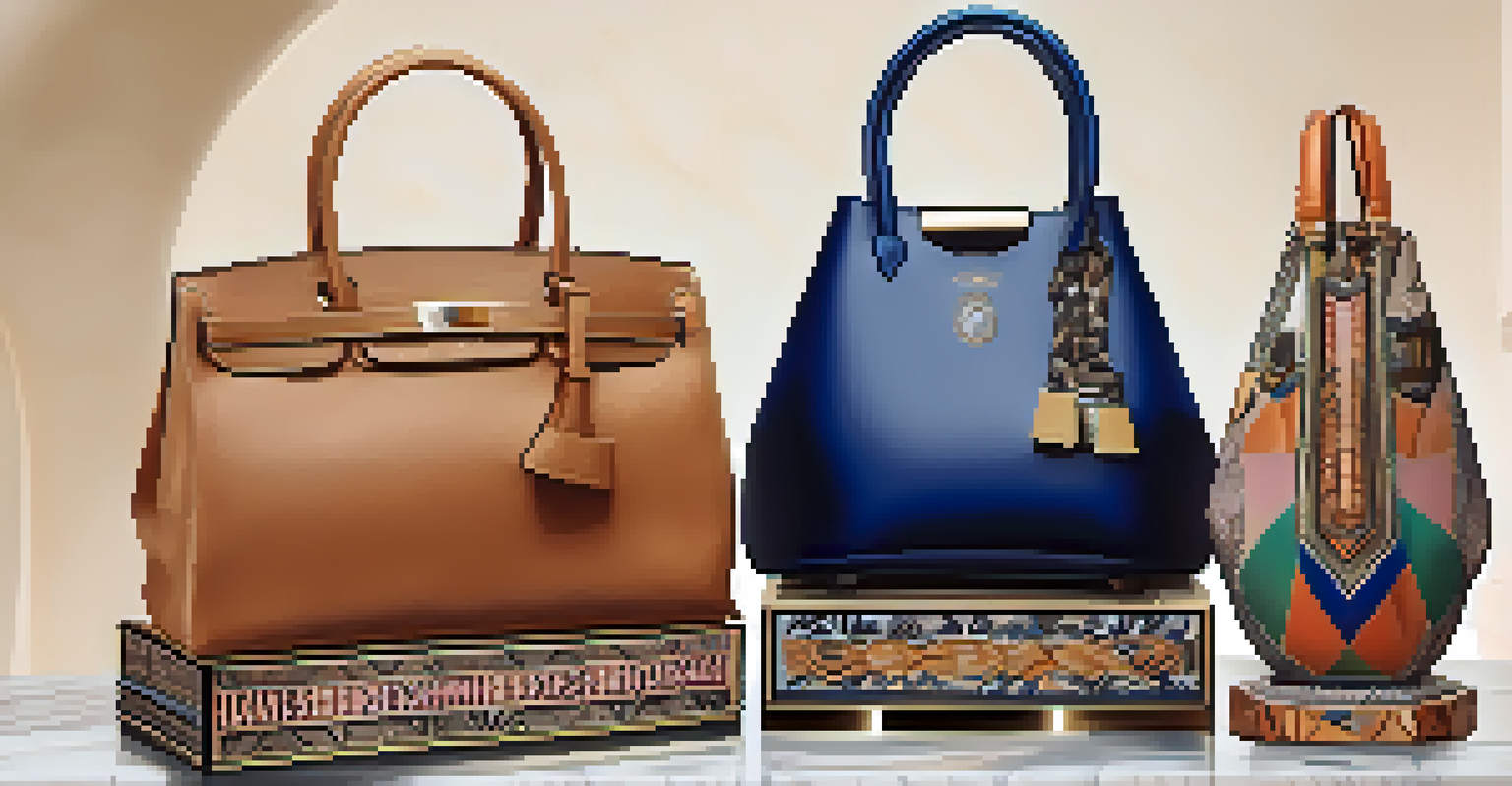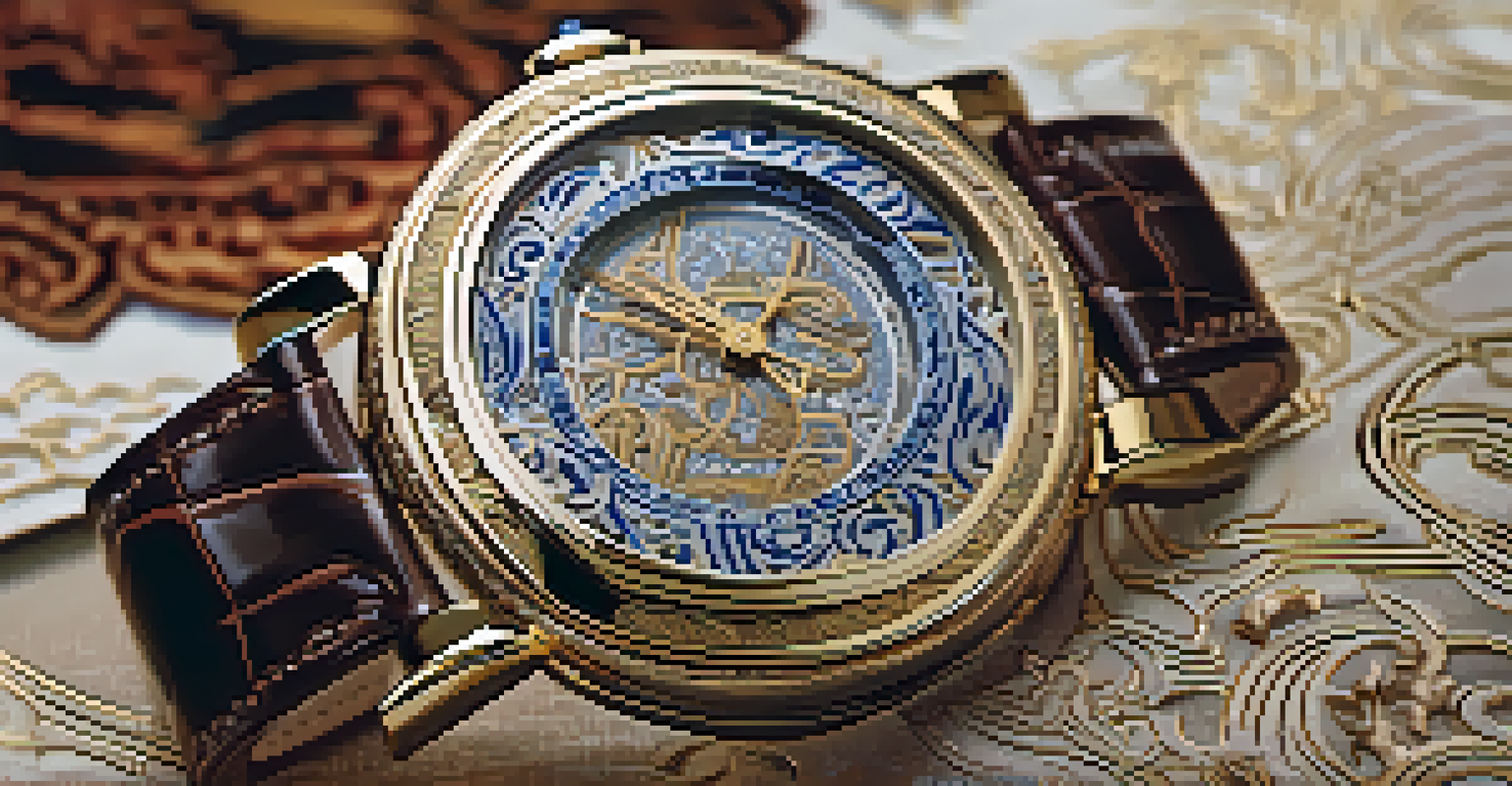The Globalization of Luxury Fashion: A Cultural Exchange

Understanding Luxury Fashion and Its Global Reach
Luxury fashion isn't just about high price tags—it's a symbol of status, craftsmanship, and identity. As brands extend their reach across borders, they not only sell products but also narratives that resonate with diverse cultures. This globalization has made luxury fashion a universal language, spoken through the threads of different cultures.
Fashion is the armor to survive the reality of everyday life.
From Paris to Tokyo, cities around the world have become fashion capitals, each contributing unique styles and influences. The ability of brands to adapt and innovate in response to local tastes has been key to their success. For instance, a French luxury house might incorporate traditional Japanese fabrics, creating a fusion that honors both heritages.
This blending of styles leads to a richer, more vibrant fashion landscape. As consumers become more globalized themselves, they seek products that reflect this blend of cultures, making the luxury market increasingly diverse and dynamic.
Cultural Influences Shaping Luxury Fashion Trends
Cultural influences play a pivotal role in shaping luxury fashion trends, often dictating what becomes popular. Designers draw inspiration from art, music, and local traditions, creating collections that celebrate various cultures. For example, the use of African prints in high fashion showcases the beauty of cultural exchange.

Social media has amplified this cultural interplay, allowing styles and trends to permeate across borders at lightning speed. Platforms like Instagram serve as a melting pot of ideas, where influencers from different backgrounds showcase their unique interpretations of luxury fashion. This instant access fosters a more inclusive fashion dialogue.
Luxury Fashion's Cultural Fusion
Luxury fashion is increasingly characterized by the blending of diverse cultural influences, creating innovative designs that resonate globally.
Moreover, collaborations between brands and local artisans are becoming more prevalent, as luxury houses recognize the value of authentic craftsmanship. Such partnerships not only elevate the brand's image but also support local economies, creating a win-win situation within the fashion ecosystem.
The Impact of Globalization on Fashion Consumption
Globalization has transformed how consumers approach luxury fashion, shifting their attitudes from mere acquisition to meaningful engagement. Today, buyers are not just looking for products; they seek stories and experiences that resonate with their values. Sustainability and ethical practices are now significant factors in purchasing decisions.
Style is a way to say who you are without having to speak.
As a result, luxury brands are adapting their strategies to cater to this evolving consumer mindset. They are investing in transparency and sustainability, ensuring that their operations align with the expectations of conscious consumers. This shift has led to a rise in brands that prioritize ethical sourcing and production methods.
Furthermore, the accessibility of luxury fashion through online platforms has democratized the market, allowing a broader audience to engage with high-end brands. This accessibility creates a diverse customer base, further enriching the cultural tapestry of luxury fashion.
Cultural Appropriation vs. Appreciation in Fashion
As luxury fashion continues to globalize, the line between cultural appropriation and appreciation becomes increasingly blurred. While borrowing elements from different cultures can lead to innovative designs, it can also raise concerns about exploitation and disrespect. The discussion surrounding this topic is crucial for the industry's growth and sensitivity.
Many brands are now more aware of the implications of their designs, leading to thoughtful collaborations that honor the cultures from which they draw inspiration. Instead of merely copying styles, designers are focusing on storytelling that respects and celebrates cultural heritage. This approach fosters a more meaningful connection between the brand and its audience.
Consumer Demand for Ethical Practices
Today's luxury consumers prioritize authenticity and sustainability, prompting brands to adopt more transparent and responsible practices.
An example of this shift can be seen in brands that engage with cultural consultants to ensure accurate representation. By prioritizing authenticity and respect, luxury fashion can navigate the complexities of globalization while promoting a harmonious cultural exchange.
The Role of Technology in Fashion Globalization
Technology has been a game changer in the globalization of luxury fashion, acting as both a bridge and a catalyst for cultural exchange. E-commerce platforms allow brands to reach global audiences, breaking down geographical barriers. This online presence makes luxury fashion accessible to consumers who might not have had the opportunity to engage with these brands otherwise.
Moreover, virtual fashion shows and augmented reality experiences are redefining how luxury is showcased and consumed. These innovations allow brands to present their collections in immersive ways, attracting attention from a diverse audience. Imagine trying on a designer dress virtually, experiencing the brand's essence without ever stepping foot in a boutique.
As technology continues to evolve, it will undoubtedly further influence the landscape of luxury fashion, enhancing connectivity and encouraging ongoing cultural exchange. The fashion industry must embrace these advancements to stay relevant and resonate with a global audience.
Consumer Behavior: The New Luxury Fashion Shoppers
Today's luxury fashion consumer is more informed and discerning than ever before. They prioritize authenticity, quality, and brand values, often researching the story behind a product before making a purchase. This shift in behavior has prompted luxury brands to refine their marketing strategies to align with the expectations of modern shoppers.
Millennials and Gen Z consumers, in particular, are driving this change, as they seek brands that reflect their values and lifestyles. They are more likely to support companies that demonstrate social responsibility and sustainability. This generation's emphasis on ethical consumption is reshaping the luxury fashion landscape.
Technology's Role in Fashion Globalization
Technological advancements, such as e-commerce and virtual experiences, are reshaping luxury fashion by enhancing accessibility and cultural exchange.
Consequently, brands are responding by highlighting their commitment to sustainable practices and cultural sensitivity. They are employing storytelling techniques that resonate with conscious consumers, creating a deeper connection beyond the product itself. This evolution in consumer behavior illustrates the importance of cultural exchange in luxury fashion.
Future Trends: The Evolving Landscape of Luxury Fashion
As we look ahead, the globalization of luxury fashion is poised to continue evolving, driven by cultural exchange and technological advancements. Brands will likely adopt increasingly inclusive approaches, embracing diverse perspectives in their design processes. This will lead to a richer and more varied fashion landscape that reflects the world we live in.
Additionally, the focus on sustainability and ethical practices will only grow stronger. Consumers will continue to demand transparency and accountability from brands, forcing them to adapt and innovate. The future of luxury fashion lies in creating a balance between opulence and responsibility.

Ultimately, the globalization of luxury fashion represents a beautiful tapestry of cultures coming together. By fostering appreciation and understanding, the industry can create a future that celebrates diversity while continuing to thrive in a global marketplace.